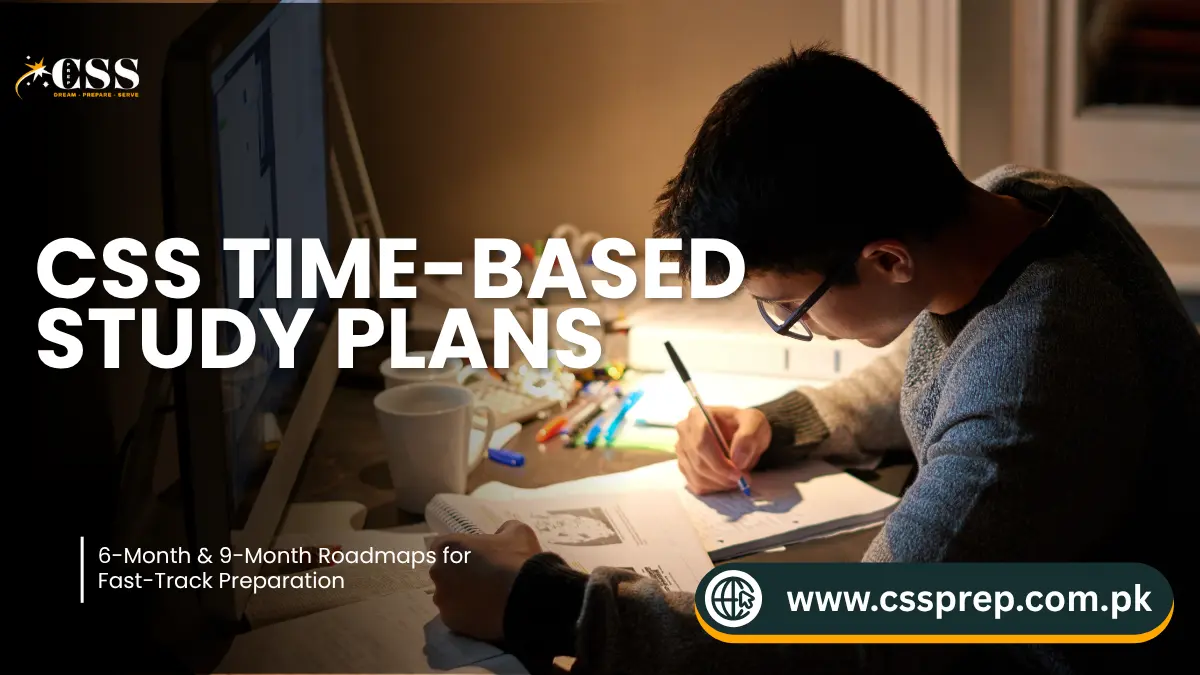CSS Time-Based Study Plans: 6-Month & 9-Month Roadmaps for Fast-Track Preparation
Preparing for the Central Superior Services (CSS) exam in Pakistan often feels overwhelming, especially if you have less than a year before the exam. Many aspirants ask, “Can I clear CSS in 6 months?” or search for a CSS 9-month preparation strategy to balance their time effectively. This detailed guide provides you with proven CSS time-based study plans, including 6-month and 9-month roadmaps, a realistic CSS preparation timetable, and practical tips to help both first-time and repeat candidates succeed in the CSS written exam.
Why You Need a Time-Based CSS Preparation Roadmap
A structured CSS study roadmap ensures that you focus on the right subjects at the right time. Without a clear CSS preparation timetable, many candidates waste weeks deciding where to start or struggle with prioritizing high-scoring subjects. By following a time-based study plan, you can:
- Manage your limited time efficiently
- Cover the CSS syllabus for both compulsory and optional subjects
- Focus on high-yield areas like Essay, Precis, Current Affairs, and Pakistan Affairs
- Leave enough time for mock exams and revision cycles
- Build confidence for the CSS written exam even if you’re a late starter
CSS Time-Based Study Plans Overview
In this article, you’ll find two tailored strategies:
- CSS 6-Month Study Plan: Designed for repeat candidates or late starters who already have a grasp of CSS basics.
- CSS 9-Month Preparation Strategy: Ideal for first-time aspirants who need more time to develop conceptual understanding.
Both plans include week-by-week subject allocation, tips for making short notes, and guidance on CSS last-minute study plans to ensure comprehensive preparation.
CSS 6-Month Study Plan for Late Starters and Repeaters
If you only have six months to prepare, you’ll need an intensive CSS preparation timetable that prioritizes essential subjects while balancing revision. This plan assumes you can study at least 6–7 hours daily on weekdays and 8–10 hours on weekends.
Phase 1: Foundation Building (Weeks 1–4)
- Focus on compulsory subjects: Essay Writing, English Precis and Composition, Current Affairs, and Pakistan Affairs.
- Dedicate 2 hours daily to Essay writing practice: work on outlines, introductions, and thesis statements.
- Improve grammar and précis writing skills in parallel.
- Read Dawn or The News daily to enhance your vocabulary and stay updated with current affairs for CSS.
Phase 2: Optional Subjects and Notes Making (Weeks 5–12)
- Start with two high-scoring optional subjects that overlap with current or Pakistan Affairs (e.g., International Relations, US History, Gender Studies).
- Allocate 3 hours daily to these subjects.
- Prepare topic-wise notes and organize past paper questions.
- Continue weekly essay writing drills to improve speed and structure.
Phase 3: Covering Remaining Optionals and MCQs (Weeks 13–18)
- Move on to your remaining optional subjects and finish their core syllabus.
- Dedicate 2 hours daily to practice MCQs for Islamiat and General Science & Ability.
- Reserve weekends for revising compulsory subjects.
Phase 4: Mock Tests and Final Revision (Weeks 19–24)
- Begin weekly mock exams to practice under real exam conditions.
- Review your mistakes in Essay, Precis, and optional subjects.
- Continue current affairs revision until the last week.
CSS 9-Month Preparation Strategy for First-Time Aspirants
A 9-month CSS preparation strategy is ideal for fresh candidates who need time to build strong concepts while balancing all subjects.
Phase 1: Orientation and Basics (Weeks 1–8)
- Read and analyze the CSS syllabus and past papers thoroughly.
- Start with foundational subjects like English Essay, Precis, General Science & Ability (GSA), and Islamiat.
- Develop a habit of daily reading and summarizing for current affairs.
Phase 2: Optional Subjects and Structured Notes (Weeks 9–20)
- Focus on one optional subject at a time for better retention.
- Make short, concise notes for all optionals to save time during revision.
- Dedicate 2–3 hours daily to essay writing and précis practice to build consistency.
Phase 3: Revision and Applied Practice (Weeks 21–32)
- Begin revision cycles every three weeks to reinforce concepts.
- Solve CSS past papers under timed conditions.
- Conduct self-assessments and quizzes to identify weak areas.
Phase 4: Final Touches Before the Exam (Weeks 33–36)
- Focus on current affairs last-minute preparation and important Pakistan Affairs topics.
- Attempt mock tests twice a week to fine-tune your writing speed and presentation.
- Work on improving answer structure with headings, flowcharts, maps, and data references.
Suggested Daily CSS Preparation Timetable
Here’s a sample CSS preparation timetable that works for both the 6-month and 9-month study plans. Adjust it according to your routine and productivity levels:
| Time Slot | Activity |
|---|---|
| 7:00 AM – 9:00 AM | Compulsory subject (Essay / English / GSA) |
| 9:00 AM – 11:00 AM | Optional subject 1 |
| 11:00 AM – 12:00 PM | Newspaper reading & Current Affairs notes |
| 1:00 PM – 3:00 PM | Optional subject 2 or MCQs practice |
| 4:00 PM – 5:00 PM | Pakistan Affairs or Islamiat |
| 6:00 PM – 7:00 PM | Essay writing or Précis practice |
| 8:00 PM – 9:00 PM | Quick revision and self-assessment |
Expert Tips for Following a Time-Based CSS Study Plan
- Prioritize high-scoring subjects to maximize your overall marks.
- Create short, smart notes instead of relying on bulky books during revision.
- Dedicate one day a week to Essay and Précis writing practice, as these are crucial for clearing the CSS written exam.
- Use visual aids like timelines, charts, and maps in your answers to make them more impactful.
- Reserve the last 4–6 weeks for revision and mock exams only.
Related Resource: How to Start CSS Preparation from Zero
If you’re completely new to the CSS journey and need step-by-step guidance on building a strong foundation before following these time-based study plans, check out our detailed guide:
👉 How to Start CSS Preparation from Zero: A Comprehensive Guide
This article will walk you through the basics — understanding the CSS syllabus, selecting optional subjects, building the right mindset, and creating a strong starting routine for beginners.







